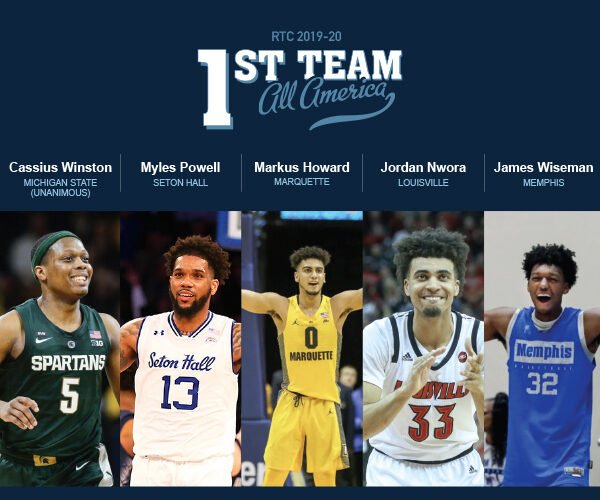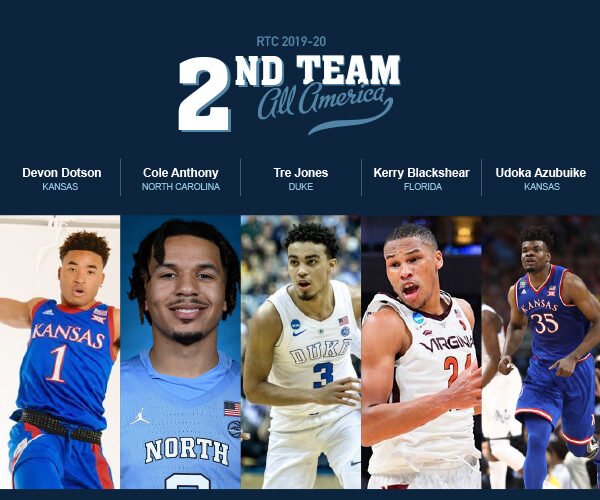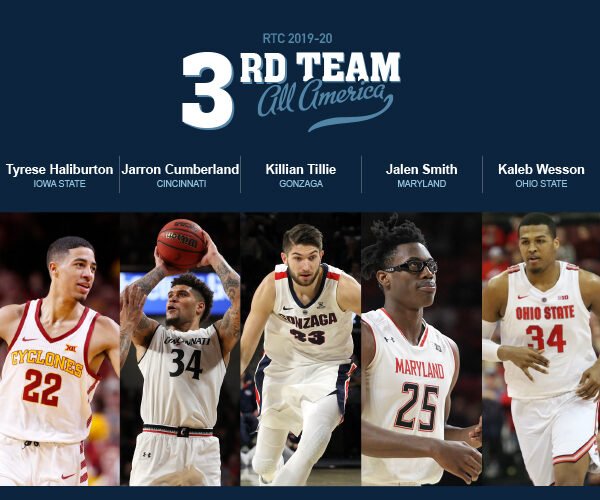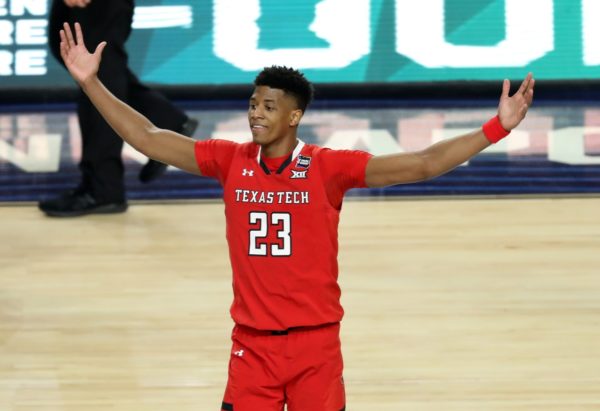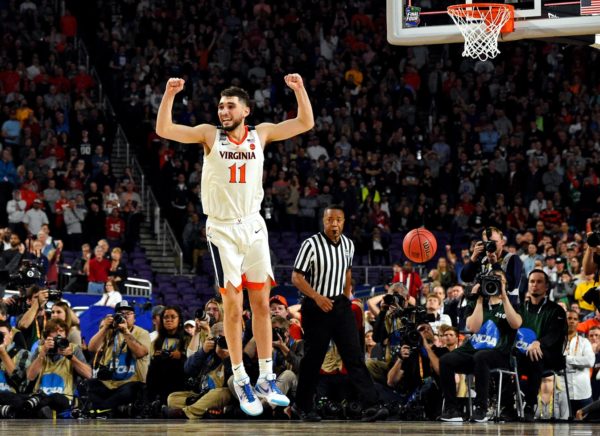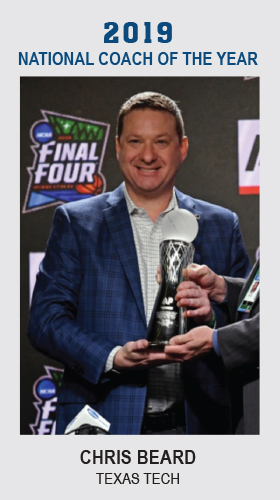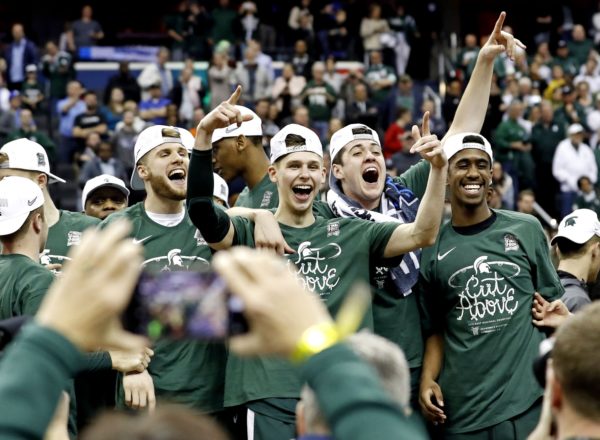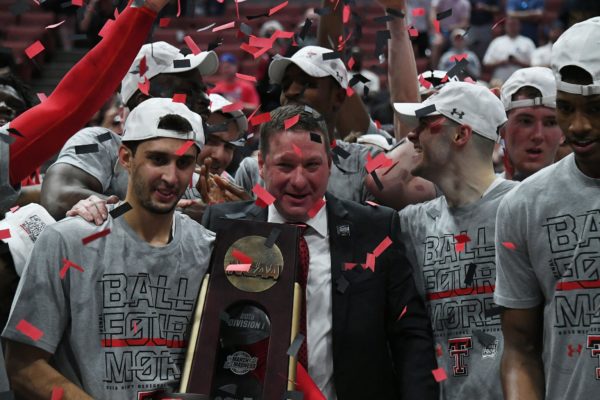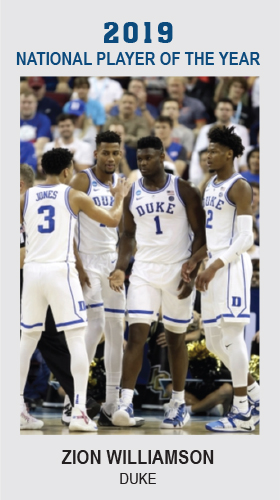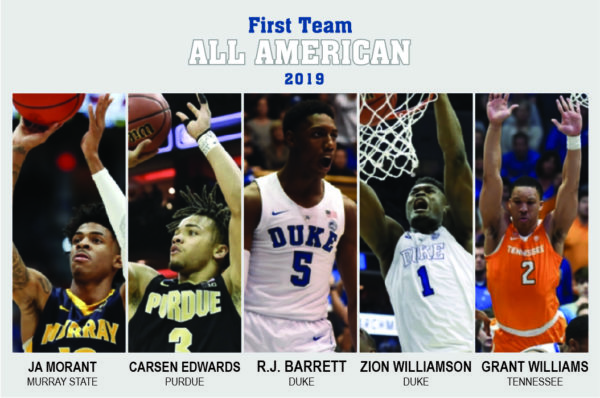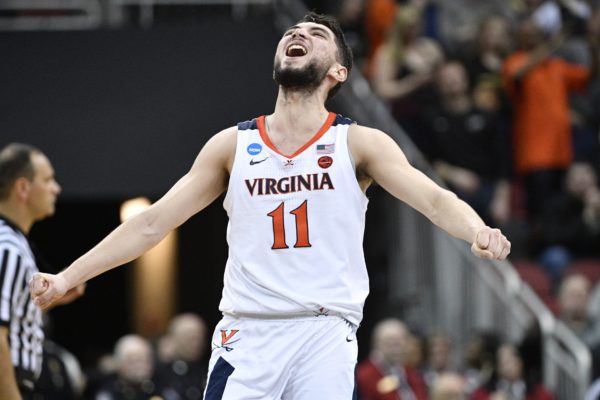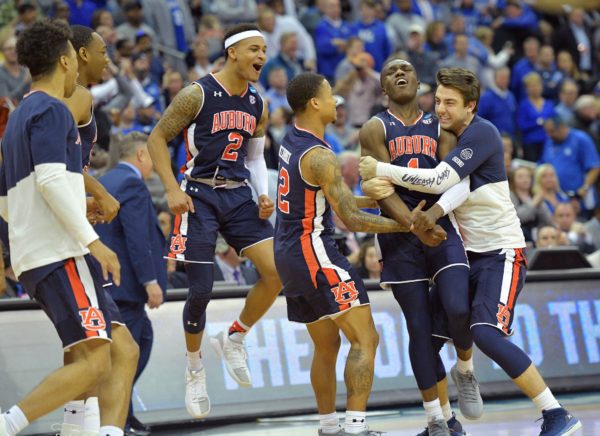The 2019-20 RTC16: Preseason Edition
Posted by Walker Carey on November 4th, 2019And so it begins — that wonderful time of year when we once again find our favorite teams playing college basketball. It is a glorious time, indeed. With a sizable slate of games set to commence on Tuesday evening, we are ready to officially unveil our 2019-20 preseason RTC Top 16. This initial poll will hold for the next two weeks, but you can expect our weekly RTC16 to release on every subsequent Monday morning starting November 18. Along with the rankings will be the usual quick and dirty analysis that dives more deeply into trends that the poll reveals. To see how we did last year, check out our 2018-19 preseason poll – sure, we nailed a few (Virginia; Duke; Gonzaga; North Carolina), and missed on some others (Kansas at #1; Syracuse; Texas Tech not even receiving a vote), but we promise to do better this time around. Here is our preseason poll. Enjoy opening week!
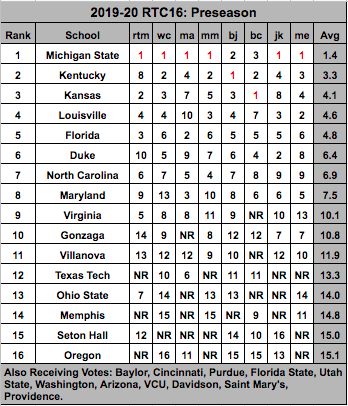
Quick N’ Dirty Thoughts.
- Michigan State checks in as the preseason #1 team. Fresh off its first Final Four appearance since 2015, Tom Izzo’s squad begins the 2019-20 season in the #1 spot of the RTC16. Reigning Big Ten Player of the Year Cassius Winston is back at point guard — and having a dynamic veteran talent like him as your floor general is a luxury few teams will ever experience. Junior forward Xavier Tillman also returns and appears primed to improve on a sophomore campaign where he averaged 10 points and 7.3 rebounds per game while shooting 60.5 percent from the field. Sophomores Gabe Brown and Aaron Henry showed flashes as freshmen and figure to be important pieces in their second seasons in East Lansing. In addition to the returning production, the Spartans enroll guard Rocket Watts and forward Malik Hall, both of whom enter college as elite prospects with decorated prep résumés. The only noticeable concerns for Michigan State are the departures of key role players Matt McQuaid and Kenny Goins, and senior guard Joshua Langford‘s injury status. Langford, who was limited to just 13 games last season with a foot injury, suffered a setback in his recovery and will remain sidelined until at least January this season. Even with Langford’s uncertain availability, the Spartans are strong contenders to both bring home another Big Ten title and cut down the nets in Atlanta in April.
- Defending national champion Virginia begins the season at #9. The Cavaliers are going to look significantly different than the group that fatefully responded to the UMBC debacle in the 2018 NCAA Tournament by capturing the National Championship this past April. Gone is the star-studded trio of Ty Jerome, Kyle Guy and De’Andre Hunter — replacing those three would be a daunting task for any team, but Virginia has maintained enough program stability over the last several seasons to make Tony Bennett‘s task much more manageable. Sophomore Kihei Clark, junior Jay Huff, and seniors Braxton Key and Mamadi Diakite each served as role players of varying degrees last season and they will all see their responsibilities increase this season. Freshman guard Casey Morsell is the new name in Charlottesville to learn. He joins Virginia — and is expected to start at shooting guard — after a highly successful prep career that culminated in the 2019 Gatorade Player of the Year award for Washington, DC. It would not be surprising to see the Cavaliers undergo some growing pains at the beginning of this season, but considering Bennett’s recent track record of developing ACC contenders, it would also not be surprising if this new-look group of Cavaliers becomes an important factor in the league race.
- All eyes will be on #14 Memphis. When Penny Hardaway took over at Memphis prior to the 2018-19 season, it was only a matter of time before the native son used his AAU ties in both the city and beyond to stock the Tigers’ roster with elite talent. Entering just his second season on the sideline, Hardaway has enrolled the top-ranked recruiting class in the country and has brought a national interest back to the program that has been missing since John Calipari was running the program more than a decade ago. The crown jewel of that class is consensus #1 recruit, James Wiseman. The athletic seven-footer spurned Kentucky to stay home and play for his hometown Tigers. Fellow freshmen Precious Achiuwa, Boogie Ellis, D.J. Jeffries, Lester Quinones, Malcolm Dandridge and Damion Baugh were all at least four-star recruits and also project to make an early impact for what will be a young Memphis squad. Success is never a sure thing for a team that will rely so heavily on freshmen, but the talent alone will make Memphis a team to track for the entire season.
Poll Defenses.
- “Louisville returns preseason ACC Player of the Year Jordan Nwora, a wing in Dwayne Sutton who averaged 10 points per game and just under seven rebounds per game. Throw in seniors Ryan McMahon, Steven Enoch and Saint Joseph’s transfer Lamarr Kimble, and I believe Louisville enters the season with few question marks. Unlike Louisville, I have too many question marks for many of the other highly regarded teams in the preseason. Florida adds Blackshear, but losses three of its four leading scorers. I have question marks with Kansas and Azubuike. North Carolina and Duke each have tons of talent, but have to replace way too much from last year’s squads for me to give them the second spot. At the end of the day, I gave Louisville the #2 preseason ranking based off of what is coming back and a bump up in year two of Chris Mack.” – RTC pollster Matt Eisenberg on his decision to rank Louisville #2, the highest of any of the pollsters.
- “It feels like Maryland has real potential to make a leap from a first weekend, 23-win team into a legitimate Final Four contender. The improvement en masse starts individually with senior point guard Anthony Cowan, who has been on the precipice of stardom for what feels like the better part of a year and a half. If he puts it all together in his final collegiate campaign, presumptive lottery pick Jalen Smith gives the Terps a viable second star. Sophomore Aaron Wiggins has all the makings of a player who takes a significant step forward in year two, after showing signs in spurts as a freshman — combine that with a dynamic and versatile incoming crop of talent, and Mark Turgeon has a roster with the balance and upside that is capable of making a run to Atlanta.” – RTC pollster Matt Auerbach on going out on a limb and tabbing Maryland as his preseason #3.
Game of the Week. #1 Michigan State vs. #2 Kentucky. The top two top teams in the preseason RTC16 will meet Tuesday night at the Champions Classic in Madison Square Garden. This will be a heavyweight battle between two Hall of Fame coaches with loaded rosters that could reasonably see each other again in Atlanta next April. The individual match-up to keep an eye on here will be Spartans point guard Cassius Winston going up against Wildcats point guard Ashton Hagans. Winston is as steady as they come and his calm demeanor coupled with his elite playmaking skills is a major key to Michigan State’s success. Hagans is a hounding defender who made a name for himself as a freshman with his ability to make opposing point guards uncomfortable. Which point guard is able to get the best of the other should play a major role in determining who departs New York with a benchmark early-season victory.
Keep Tabs On. #3 Kansas vs. #6 Duke; #7 North Carolina vs. Notre Dame; #13 Ohio State vs. Cincinnati; #9 Virginia vs. Syracuse; #5 Florida vs. Florida State; #14 Memphis vs. #16 Oregon; #11 Villanova vs. #13 Ohio State; #1 Michigan State vs. #15 Seton Hall.
Conference Call. ACC (4), Big Ten (3), SEC (2), Big 12 (2), Big East (2), WCC (1), AAC (1), Pac-12 (1).





























